Pandora's Books in N.C. Closing
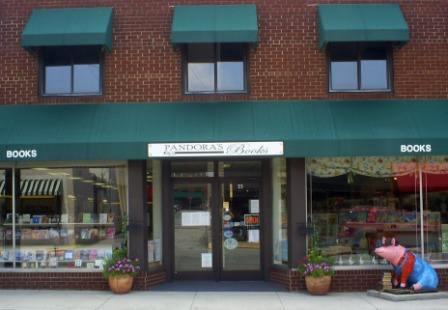

Books-A-Million will close its store at the Bridgewater Falls Lifestyle Shopping Center in Fairfield Township, Ohio, March 15, the Journal-News reported. BAM spokeswoman Christine Corbitt confirmed the company's decision and said there will be a going-out-of-business sale until the closing date.

Czech president Milos Zeman called the decision by Brno's assembly members "stupid" and "criticized the fact that the south Moravian city thus lost the opportunity to have 2,000 new jobs," CTK (via the Prague Daily Monitor) reported." Industry and Trade Minister Jan Mladek said he would offer Amazon another location in the country in hope of preventing the company from leaving the Czech Republic.
At a large-store roundtable discussion at a Winter Institute several years ago, Mitchell Kaplan, owner of Books & Books in Miami, Fla., realized that something was amiss with the traditional inventory model. "The first order of discussion was how to make your store look full when you don't have a lot of inventory in it," recalled Kaplan. "These were some of the biggest, best stores in America. They should be filled to the brim with books."
 |
|
| Kaplan | |
For Kaplan, a partial answer to this problem lies in consignment buying, which he and some other indie booksellers have been experimenting with increasingly. In this model, booksellers are billed only for stock that they sell.
"You're never confronted with the question of 'should I pay for it or return it,' " explained Kaplan, who works with some 25 publishers on consignment. "It creates more of a partnership. You're able to make buy decisions more rationally based on what you think you can sell. You can also then more easily take advice from publishers when they want to promote something in greater quantity, without having to worry about the effect it will have on your payable. And it brings everybody closer to the profit."
The first consignment account for Boulder Book Store in Boulder, Colo., was with Sounds True, a local small press that began as an audio publisher. "I approached them because they're local," recounted Arsen Kashkashian, Boulder Book Store's head buyer. "I talked to them about it being a partnership. With consignment we could display a lot of their stuff, rather than buying things in ones or twos. It doubled our business with them; it's been a very successful partnership."
Shortly after partnering with Sounds True, Boulder Book Store began partnering with Chelsea Green Publishing, whose books focus on sustainability and the environment. Boulder Book Store's consignment program has since expanded to include 10 bays of books, with each bay filled with books from a single publisher.
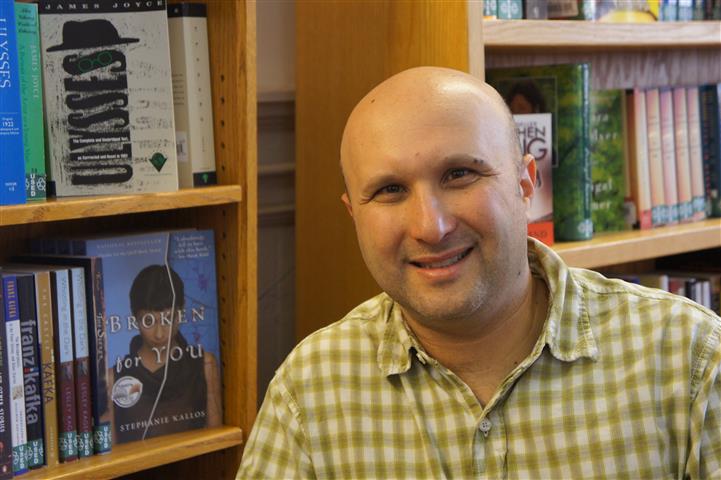 |
|
| Kashkashian (photo: literarylines.com) |
|
"There are benefits to grouping all of a publisher's books together," Kashkashian said. "We wouldn't want to do the whole store that way, of course, but for presses with a specific mission it does have an appeal."
He added that consignment makes it easier to fill the 20,000 square feet store with as many new books as possible, as opposed to used books or remainders. "For us, compared to a smaller store, consignment seems a little more critical," Kashkashian added. "If I'm trying to fill the store and I'm on a budget, it's a lot more doable with consignment."
Chris Morrow, co-owner of Northshire Bookstore in Manchester Center, Vt., began acquiring some merchandise on consignment some five years ago. The first supplier with which he partnered was a children's clothing line.
"We felt [they] needed wide representation to sell well, but we didn't have the money to devote to it," said Morrow, who estimates that about 7% of his current inventory, including sidelines, is on consignment. The children's clothing supplier remains his biggest consignment partner.
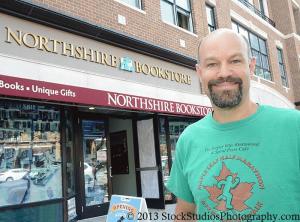 |
|
| Morrow | |
He described the benefits of consignment--bringing in more stock and being able to keep that stock for longer periods of time--this way: "It ain't rocket science. If we have it, we have a better chance of selling it."
Some 21 stores take part in Chelsea Green Publishing's consignment program, which has been operating since 2010. According to Michael Weaver, the press's trade and export sales manager, consignment is not something that would work with every indie, at least not in the way that Chelsea Green operates. The details can vary from store to store, but each store has to have a stand-alone Chelsea Green section. Beyond that, the publisher leaves merchandising and management entirely to the booksellers.
Consignment programs "can result in a lot of inventory that doesn't sell, and that's in no one's interest," Weaver said, but "as we have it construed, it works well, because of the niche of our books and the communities of the stores we partner with. It's also easier for us because we distribute everything ourselves. There's some resistance on the part of publishers, because it's a hassle to manage different inventory systems. So publishers have tried to respond to booksellers' needs in different ways. From our point of view, a pure consignment program wouldn't work."
Morrow, too, cautioned that consignment is not a "cure-all," but felt that where appropriate, more booksellers should adopt it. "The billing and accounting can be difficult for some publishers, depending on their internal systems," he said. "It can be a little more work for the bookstore to set up a consignment system initially, but it is worth it, we find."
Kashkashian is trying to get other publishers on board with consignment. "For small or medium size presses, it can definitely work," he said. Working with major publishers, though, would generate problems. "Obviously it would have to be different for big presses; we're not going to give Penguin 72 of our bays or whatever," Kashkashian said, and advocated a kind of modified consignment model. "With big presses, I'm finding that if you can get dating extended far enough--nine months or a year--it's effectively consignment," he said. "We can carry everything, make the store look good, but we're not out on a limb financially."
Kaplan believes that the wider adoption of the consignment model would be a "game changer" for the book business, but he acknowledged possible stumbling blocks. Most of them, he said, had to do with publisher systems and entrenched methods. Another issue was one of perception; consignment is simply not perceived as the way to do things. Other industries, and bookstores in other parts of the globe, could serve as models.
"Each store has to decide what's appropriate," he said. "It's not something you put on autopilot; buying decisions still need to be made. But the bottom line is it wouldn't be viable but for the fact that it increases sales. I see triple-digit sales increases when you go to this model. Consignment is one way indies can survive and thrive." --Alex Mutter
|
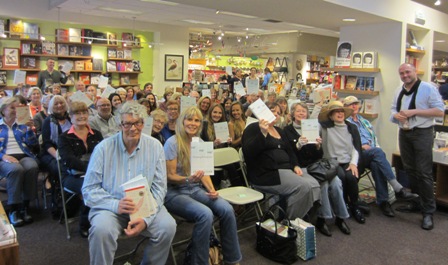 On Sunday, Colum McCann discussed and signed Transatlantic at Warwick's in La Jolla, Calif., as part of the store's National Book Award Winners Weekend.
On Sunday, Colum McCann discussed and signed Transatlantic at Warwick's in La Jolla, Calif., as part of the store's National Book Award Winners Weekend.
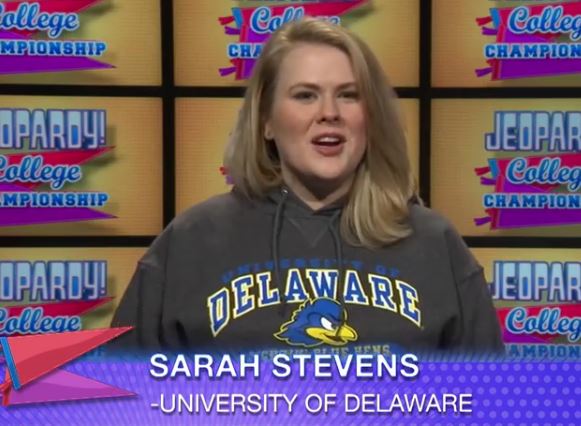
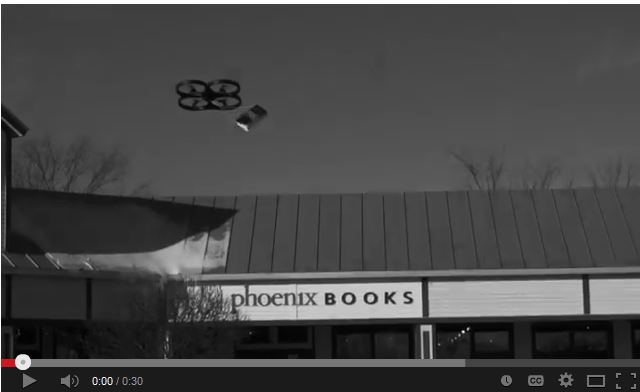
 Geekwire profiled Ada's Technical Books and Café, Seattle, Wash., which specializes in "geeky books, gizmos and community" and has "developed a thriving community of fans and found success" that continues after its November move. (The store was also profiled last fall by the Stranger.)
Geekwire profiled Ada's Technical Books and Café, Seattle, Wash., which specializes in "geeky books, gizmos and community" and has "developed a thriving community of fans and found success" that continues after its November move. (The store was also profiled last fall by the Stranger.)
Among the news from Ada's: owners Danielle and David Hulton have begun accepting bitcoins as a payment method, processing "transactions in the cryptocurrency, and then convert[ing] the digital money into cash," Geekwire wrote. "While David said that he has been mining bitcoins for the past couple years, holding onto bitcoins is not the right call for Ada's at the moment. Between unclear government regulation, price fluctuations, and the fact that the store has only processed a handful of transactions in Bitcoin, converting bits into cash makes the most sense. 'Just continuing to participate in the community, that's a huge part of our business model in general,' says Danielle."
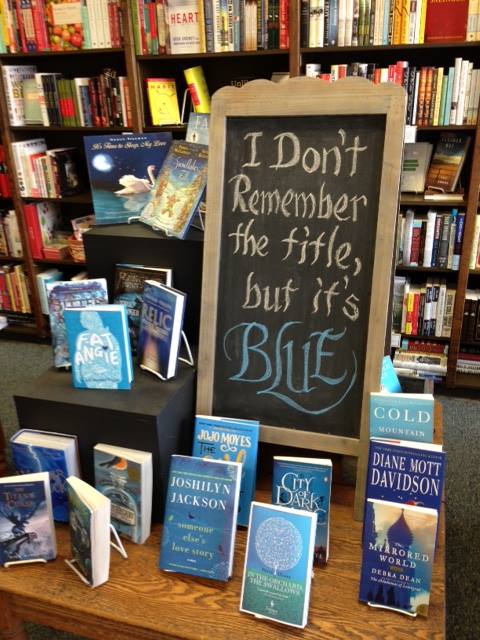 Blue Willow Bookshop, Houston Tex., created a store display that offered a clever solution to a question (with infinite variations) that booksellers worldwide field on a daily basis: "I don't remember the title, but the cover was blue."
Blue Willow Bookshop, Houston Tex., created a store display that offered a clever solution to a question (with infinite variations) that booksellers worldwide field on a daily basis: "I don't remember the title, but the cover was blue."

Tomorrow on NPR's Diane Rehm Show: Su Meck, co-author of I Forgot to Remember: A Memoir of Amnesia (Simon & Schuster, $25, 9781451685817).
---
Tomorrow on the View: RoseMarie Terenzio, author of Fairy Tale Interrupted: A Memoir of Life, Love, and Loss (Gallery, $15, 9781439187685).

Films with book connections won in several categories at this year's British Academy of Film and Television Arts film awards, which were announced Sunday in London. The winners included:
12 Years a Slave, based on the book by Solomon Northup: best film, leading actor (Chiwetel Ejiofor)
Philomena, based on The Lost Child of Philomena Lee by Martin Sixsmith: adapted screenplay (Steve Coogan, Jeff Pope)
Captain Phillips, based on A Captain's Duty: Somali Pirates, Navy SEALs and Dangerous Days at Sea by Richard Phillips and Stephan Talty: supporting actor (Barkhad Abdi)
Frozen, inspired by Hans Christian Andersen's story "The Snow Queen": animated film
The Great Gatsby, adapted from F. Scott Fitzgerald's novel: production design, costume design.
The Great Beauty (Although this isn't a book-to-film adaptation, Film Comment has noted that director Paolo Sorrentino's novel Everybody's Right "is everywhere in Sorrentino's world because literature has always been his true calling"): film not in the English language.
The three finalists for the George Washington Book Prize, which recognizes "the year's best new books on early American history," are:
The Men Who Lost America: British Leadership, the American Revolution, and the Fate of the Empire by Andrew Jackson O'Shaughnessy (Yale University Press)
The First Presidential Contest: 1796 and the Founding of American Democracy by Jeffrey L. Pasley (University Press of Kansas)
The Internal Enemy: Slavery and War in Virginia, 1772-1832 by Alan Taylor (Norton)
The winner, who receives a $50,000 award, will be announced May 20 at Mount Vernon, which sponsors the prize with the Gilder Lehrman Institute of American History and Washington College.
---
Finalists have been announced in 29 categories for the 2014 Audie Awards, sponsored by the Audio Publishers Association. Winners for this year's awards, which include the new category of erotica, will be announced on Thursday, May 29, at the Audies Gala in New York City.
Trapped Under the Sea: One Engineering Marvel, Five Men, and a Disaster Ten Miles Into the Darkness by Neil Swidey (Crown, $26 hardcover, 9780307886729, February 18, 2014)
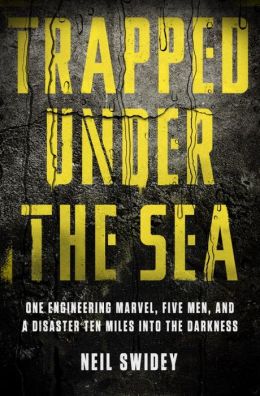
Swidey, a staff writer for the Boston Globe magazine and finalist for the National Magazine Award, tells his story with exhaustive research, but he also tells it with passion. He colors in the lives of each of the five divers, giving DJ Gillis, a young pile driver with a very active romantic life, the strongest presence. And he seems fueled by the idea that no great engineering feat comes without the sacrifice of otherwise unheralded workers, a theme he returns to throughout the book.
What makes Trapped Under the Sea stand out from other disaster narratives is Swidey's exhaustive, largely balanced analysis of the corporate and political pressures and the human ambitions that led to a series of bad decisions, with insights into organizational behavior and culture and the ways decisions can go tragically wrong. An arrogant engineer who misrepresented his experience, corporate jockeying, cost-cutting, the intense pressure of deadlines on a long-delayed, very expensive and very public project: that these factors are common in projects at every level makes them no less deadly--or preventable.
Swidey's focus beyond the accident and its roots to its aftermath, as the survivors and victims' families coped with trauma and guilt through the heartbreaking, frustrating effort to seek justice, will leave the reader gripped, saddened and infuriated in equal measure. --Jeanette Zwart
Shelf Talker: Swidey's gripping account of a preventable disaster--and an exposé of the personal, political and corporate factors that led to it--will appeal to fans of A Perfect Storm and A Civil Action.